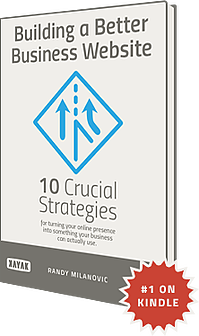It can be tough for marketers to balance the need for doing with the necessity of thinking and planning, which is why so many companies have great strategies that they never really get around to executing.
The opposite can be true, however – jumping straight into a campaign without doing the prerequisite research can cause you to waste valuable time and money.
This is a topic I outlined in my latest book, Building a Better Business Website. As it turns out, doing something without the right information is only marginally better than doing nothing at all. To see why this is, let's look at seven common ways online marketers hurt themselves:
1. They guess at keywords.
While brainstorming search terms and phrases that prospects might use to find a company like yours is a good first step, thorough keyword research and analysis is needed to help refine the list. Otherwise, you could devote huge amounts of time targeting keywords and phrases that aren't likely to lead buyers in your direction.
2. They don't use buyer personas.
I've covered the importance of marketing personas in the past, so I won't dwell on them here. But, it's worth mentioning that very, very few businesses really only have a single type of customer. Therefore, having a single persona that you're solely focusing on could mean you're missing out on big sections of the market.
3. Their buyer personas aren't detailed enough.
 Likewise, marketing personas shouldn't just contain basic stats or demographics information – they should be fully-formed "people" with specific needs and motivations. The more detailed you can be, the easier it will be to generate content and marketing messages that catch the attention of key prospects. Get creative and develop a back-story for each persona.
Likewise, marketing personas shouldn't just contain basic stats or demographics information – they should be fully-formed "people" with specific needs and motivations. The more detailed you can be, the easier it will be to generate content and marketing messages that catch the attention of key prospects. Get creative and develop a back-story for each persona.
4. They don't truly understand the competition.
A lot of businesses have a general sense of who their main competitors are, but couldn't begin to tell you why some customers prefer those products or services over their own. To bridge that gap, you need to learn to think like a buyer and decide which unique benefits other businesses are offering and then work to differentiate and expand on the best selling points in your favour.
5. They fail to distinguish information from valuable insight.
In marketing, you can have both data and insight, but it's important to distinguish them from each other. In other words, what you know isn't the same as what you understand, or the conclusions that can be drawn from raw information. If you fail to analyze things like web analytics closely enough, you could arrive at false conclusions, or accept incorrect preconceptions.
6. They don't use what they know.
Even with strong marketing research plans in place, some business owners like to "shoot from the hip" and develop campaigns that they like, rather than ones that might be effective at generating leads. Typically, this occurs when entertainment value (or preference for specific designer or visual theme) are emphasized over ROI.
7. They don't look at ongoing trends and results.
Marketing information and feedback aren't static. Even though market information is most important at the start of development for a new campaign, it should always be reviewed and refined over time. You should know more today than you did yesterday, and the feedback you get from buyers (both directly and through their actions) should always lead your decision-making going forward.
Do you really have the information you need to put together a profitable and sustainable online marketing campaign? If not, have your digital agency help you get the data you need now, because it's going to save you a lot of time and aggravation later.




